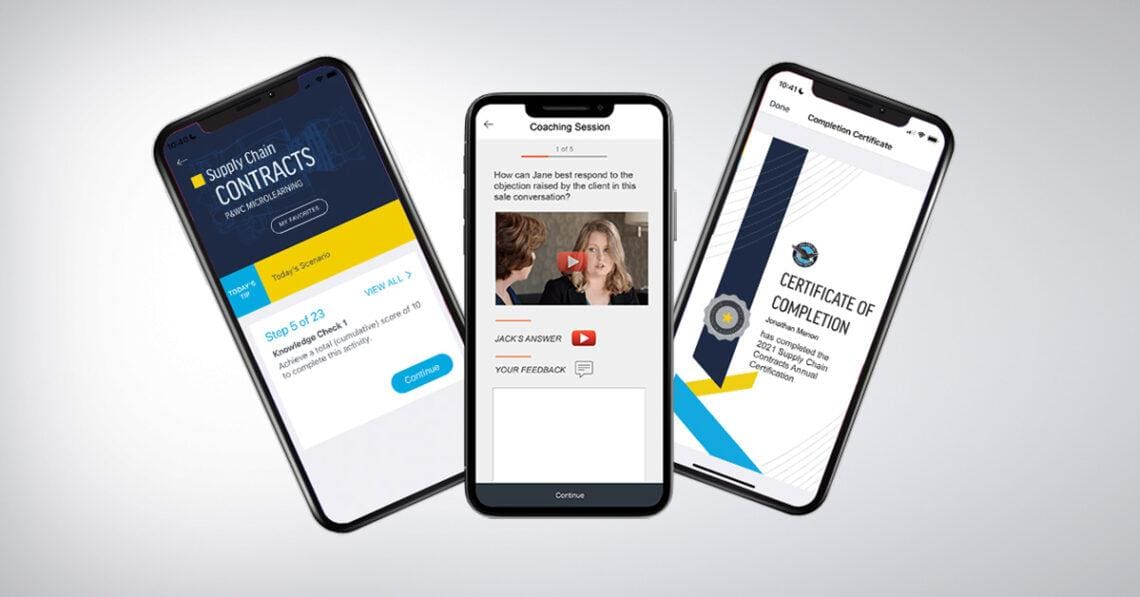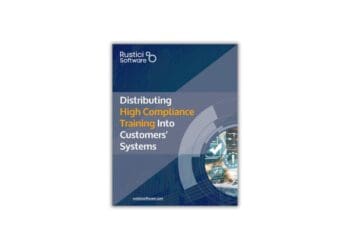Pratt & Whitney’s American jet engine division hit a patch of turbulence earlier this year, and while the company’s Canadian operations aren’t immune to challenges, they’ve recently tackled one that’s decidedly more down-to-earth: compliance training. Ina Junona Nicolae, a training leader at Pratt & Whitney Canada, talks about how the manufacturer used microlearning to bridge the gap between knowing compliance — and actually doing it.
Few business sectors were hit harder by the supply chain disruptions from the pandemic than heavy manufacturing. Such is the case for Pratt & Whitney Canada. We manufacture aircraft engines for 13,000 customers operating in more than 200 countries.
Our supply management team makes sure billions of dollars in quality engine parts from more than 400 international suppliers arrive on our production lines in time to be assembled on the factory floor. Covid caused drastic demand changes in the aerospace industry, straining vendor capabilities, creating new risks and posing severe logistical challenges. The pandemic transformed our supply management division into a mission-critical part of the enterprise.
Like most companies in our industry, we are highly regulated. SOX mandates annual compliance training for all our supply chain employees who negotiate and execute contracts. We have traditionally met this SOX audit requirement with annual instructor-led training conducted by experts from our legal department, supplemented with videos and webinars.
The trouble with the conventional compliance training model
Many companies attempt to meet compliance requirements by taking attendance at classroom training sessions or by tracking completion of online courses. There are major problems with this approach. Even eager employees find passive e-learning courses tedious and compliance lectures dull. The boredom suffered by employees is matched only by the frustration felt by leaders, because these programs offer no way of determining if learners can turn their new knowledge into compliant behavior or even if they can remember what they were taught. That’s dangerous, especially when the U.S. DOJ is fining companies millions of dollars because of their inadequate programs.
Findings from cognitive science show that sitting through day-long classes or flipping through monolithic blocks of e-learning content are among the worst ways to learn. So why do we still do it? Not because it’s effective, not because it’s efficient — but merely because it’s the way we’ve always done it. No part of our business can succeed by resting on tradition, and training is no exception.
But upheavals create new opportunities. At PWC, we saw the disruption created by the pandemic as an opportunity to explore a different approach to compliance training.
Team Tuning Out Same Old Compliance Messaging? Mix Things Up.
You’ve got the CEO’s buy-in that your ethics and compliance program is a central part of the company’s culture. That’s great news, but are you using their presence in the right way? Living Your Best Compliance Life columnist Mary Shirley offers her spin on well-worn training activities.
Read moreDetailsMicrolearning
We adopted an adaptive microlearning platform to provide the foundation of our new approach. Microlearning uses concise learning modules, delivered over a mobile app or the web, designed for quick engagement. Because microlearning content is built in small pieces — about three to 10 minutes in length — it is brief enough to fit unobtrusively into the free moments that pepper each employee’s workday.
Microlearning places the emphasis on active engagement with a learning program, not passive consumption of content that characterizes traditional e-learning. Microlearning formats involve the learner in some kind of interaction, from something as simple as flipping a flashcard to as complex as answering a set of questions with corrective feedback, or activities that use game mechanics like competitions and leaderboards to encourage regular participation.
Compliance requirements evolve and regulations change frequently, but the long e-learning production cycle means companies usually only update e-learning compliance courses every six months or once a year. Microlearning is delivered over time and reinforced year-round instead of being stuffed into an annual cramming session. And because microlearning modules are so small, it’s easy to update or replace them quickly with common business tools without affecting the rest of the program.
An adaptive learning program
Compliance training is often delivered with a firehose. Our learners get swamped with everything, regardless of their previous expertise or existing base of knowledge. The result is a monolithic program that re-teaches learners things they already know: a learning experience that is inflexible, time-consuming and redundant.
But each of our employees is unique. They come to learning with different beliefs, motives, skills and knowledge. Our adaptive platform uses machine learning to profile learners along three axes to assemble a customized program for each: who they are, what they know and how they interact with the training program. It refines a personalized experience tailored to address their unique knowledge and skill gaps, an optimal sequence of activities that will direct them along the most efficient path to mastery. Adaptive learning views the differences between learners as opportunities to be exploited, not obstacles to be avoided.
As learners progress, the platform scrutinizes the rate and pattern by which they remember or forget what they have learned and adjusts their learning path. It can take into account how a learner compares with others in their peer group or performs against specified competencies. By focusing on specific knowledge gaps, adaptive learning makes sure that only the right learning gets to the right people. It makes learning more flexible and relevant, freeing each person from being sidetracked by everyone else’s priorities. This means our learning programs are more engaging and can treat subjects in greater depth while demanding less of each employee’s time.
When built on an adaptive model, compliance training becomes effective, efficient and enjoyable. It empowers individuals to take control of their own learning.
Knowledge retention
Remembering what you have been taught is the first step in transferring learning into behavior on the job. But a hundred years of research shows that learners forget most of what they have learned within just a few days after a formal training program. Forgotten compliance knowledge exposes us to critical errors, costly delays and potential sanctions by the regulating agencies. This is especially a problem for procedures that are performed rarely but are no less critical to the business.
It has been scientifically proven that periodic recall exercises, spaced out over time, are the best way to interrupt the process of forgetting. With a training reinforcement program, our learners can retain up to 80% of their new knowledge over the long term. Our adaptive platform serves up recall activities lasting just a few minutes each day to strengthen our employees’ mental pathways and root their new compliance knowledge in long-term memory. Training reinforcement helps our team members carry the knowledge they have gained in training into the field, bridging the gap between knowing compliance and doing it.
The Covid-19 pandemic transformed our supply management operations into a mission-critical part of our business. To meet our SOX requirements, compliance has to be a habit, not an event. The problem with annual compliance training is that it happens only once a year, but compliant behavior has to unfold over the remaining 364 days.
Too much information packed into an instructor-led training program made it difficult for our people to connect the dots or relate it to their work. But by focusing on each person’s unique knowledge and skill gaps, microlearning gives our learners a personalized, concentrated experience, spaced out over time in a simple, timely and cost-effective manner. And by reinforcing new knowledge with structured recall practices that produce long-term retention, our adaptive microlearning program avoids weary employees and frustrated leaders. At Pratt & Whitney, it’s changing the way we do training.




 Ina Junona Nicolae is workforce capability development manager in Pratt & Whitney's supply management organization. She is an experienced supply chain professional with demonstrated history of working in aerospace industry, including seven years with Bombardier Aerospace and the past 17 with Pratt & Whitney Canada.
Ina Junona Nicolae is workforce capability development manager in Pratt & Whitney's supply management organization. She is an experienced supply chain professional with demonstrated history of working in aerospace industry, including seven years with Bombardier Aerospace and the past 17 with Pratt & Whitney Canada. 









